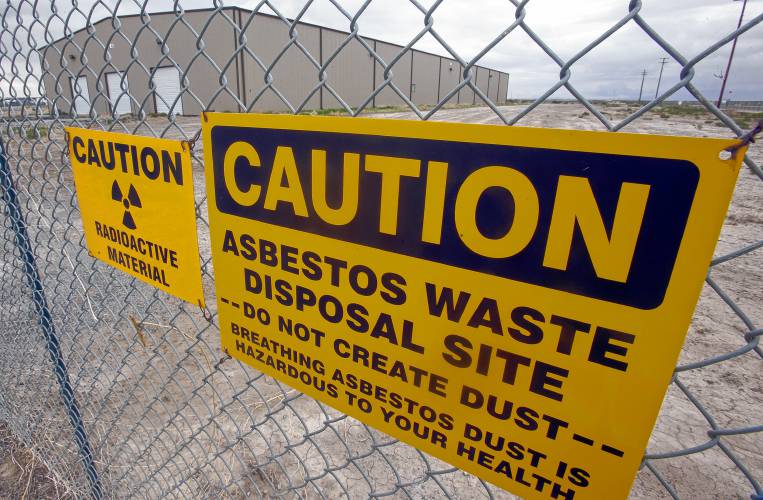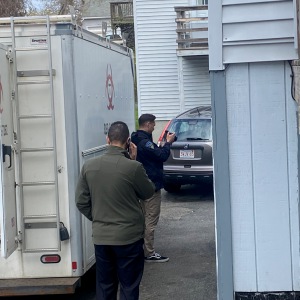My Turn: Asbestos exposure can still compromise Massachussets veterans’ health

A caution sign hangs on a fence in front of a building that houses asbestos and depleted uranium in May 2015 at the EnergySolutions facility in Clive, Utah. AP
| Published: 04-08-2024 6:03 PM |
Over the last century, the U.S. military has primarily used asbestos because the World War II war effort needed cheap materials to mass-produce military equipment quickly. Considered a “wonder material,” asbestos was abundant in the markets, and manufacturers wanted to take full advantage of its versatility and low price. No one had considered the health risks of mixing asbestos in insulation products for military properties such as aircraft, vehicles, engine rooms, barracks, mess halls, ships, and shipyards.
The growing number of toxic exposure cases among veterans today highlights the many invisible health risks they faced during their service, including asbestos exposure. The consequences of exposure to harmful asbestos fibers can overshadow the health of many veterans as they enter a stage of life where staying healthy can be a challenge.
Ships needed insulation from bow to stern while facing battles at sea. As a result, the Navy primarily used asbestos, and naval personnel on vessels built before the 1980s ran an exceptionally high risk of asbestos exposure. However, this does not rule out the possibility that other military bases are a potential source of asbestos contamination. For this reason, asbestos exposure remains a concern for all veterans who may have toxic fibers in their lungs, including those among the veteran community in Massachusetts and Greenfield’s veterans.
Greenfield’s WWII history is intertwined with the Massachusetts National Guard, which has federal and state responsibilities. The Massachusetts Army National Guard Infantry was one of the first U.S. Army regiments to enter combat in World War II. Moreover, the Air National Guard’s 101st Observation Squadron was assigned to fly antisubmarine patrols, and the Massachusetts Military Reservation and Camp Edwards were troop training sites for several central units during WWII. Greenfield’s current military roots include the U. S. Marine Corps Recruiting Station Sub, an important center for those who wish to defend our nation’s ideals.
Massachusetts’s WWII military past includes Hanscom Air Force Base, the former Bedford Airfield, which hosted hundreds of planes and U.S. Army Air Corps pilots throughout World War II. The state is also home to Westover Air Force Base, a training field for professional troops during the war.
While serving in the military, former service members faced various threats, including exposure to toxic substances. Veterans may have worked and lived near asbestos materials, unaware of the danger. This is why a significant number of veterans develop asbestos-related illnesses decades later.
Asbestos can remain airborne for hours due to the structure and size of its fibers and can be easily inhaled or ingested, making asbestos dust one of the most toxic substances. Once inside the body, these tiny, sharp threads cause permanent damage, particularly to the lungs, and lead to devastating diseases.
Article continues after...
Yesterday's Most Read Articles
 Authorities ID victim in Greenfield slaying
Authorities ID victim in Greenfield slaying
 State records show Northfield EMS chief’s paramedic license suspended over failure to transport infant
State records show Northfield EMS chief’s paramedic license suspended over failure to transport infant
 Police report details grisly crime scene in Greenfield
Police report details grisly crime scene in Greenfield
 On The Ridge with Joe Judd: What time should you turkey hunt?
On The Ridge with Joe Judd: What time should you turkey hunt?
 ‘I have found great happiness’: The Rev. Timothy Campoli marks 50 years as Catholic priest
‘I have found great happiness’: The Rev. Timothy Campoli marks 50 years as Catholic priest
 Formed 25,000 years ago, Millers River a historic ‘jewel’
Formed 25,000 years ago, Millers River a historic ‘jewel’
One of the most frightening aspects of asbestos-related diseases is the decades-long latency period between exposure and first symptoms. Even if veterans did not have health problems during their service, they would only feel the effects of asbestos exposure over time when they are diagnosed with resulting illnesses, such as asbestosis, mesothelioma, lung cancer, or other serious respiratory diseases.
Although decades have passed since the military’s excessive use of asbestos, veterans who came into contact with it during their service must now fight for their health. Many have to face the harsh reality that diseases caused by asbestos not only affect them physically and psychologically, but also shorten their lives.
Since Massachusetts ranks 11th in the U.S. for deaths related to asbestos exposure, including mesothelioma, asbestosis, and lung cancer, veterans should call their doctors immediately to make an appointment. Given that early detection can improve treatment outcomes and prolong life, they should be proactive about their health by:
■Regular medical examinations. Periodic checkups and open discussion about military service and possible asbestos exposure are essential. Inhaled asbestos fibers initially affect the lungs, so veterans should request chest X-rays or CT scans and pulmonary function tests (also called breathing tests). These tests help detect damages caused by asbestos fibers and provide a reliable diagnostic method for benign and malignant asbestos-related diseases.
■Learning about their legal rights. Veterans who know they’ve worked in an asbestos-contaminated environment during their service or who suspect they were exposed should know their rights and options. Legal avenues and compensation programs are available to help vets injured by asbestos exposure through asbestos trust funds and VA disability benefits.
■Promoting awareness. Veterans can play a vital role in educating and raising awareness by sharing their knowledge and experiences about asbestos exposure. By being open, they can make sure that others who protected our nation are informed.
In addition to expressing our gratitude to veterans, we also have a responsibility to help protect their well-being. Awareness of asbestos exposure is an essential part of this responsibility. By spotlighting this still-lurking danger, we can ensure that those who served receive the care and support they rightly deserve.
Cristina Johnson is a Navy veteran advocate for Asbestos Ships Organization, a nonprofit whose primary mission is to raise awareness and educate veterans about the dangers of asbestos exposure on Navy ships and assist them in navigating the VA claims process.

 Columnist Daniel Cantor Yalowitz: Staying real, remaining humble
Columnist Daniel Cantor Yalowitz: Staying real, remaining humble Araceli Katalin McCoy: Why we should change the voting age to 16
Araceli Katalin McCoy: Why we should change the voting age to 16 Emily Gaylord: Shores Ness brings experience
Emily Gaylord: Shores Ness brings experience Arlene and Doug Tierney: Vote for Blake Gilmore on May 6
Arlene and Doug Tierney: Vote for Blake Gilmore on May 6
